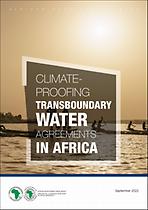
Book
Climate proofing Transboundary Water Agreements in Africa
Attachments [ 1 ]
More Details
Africa’s water resources have the potential to stimulate economic growth, secure livelihoods, and alleviate poverty. Transboundary water (TBW) resources are especially important in Africa, where 63 international transboundary river basins cover about 64% of the region’s land area and account for 93% of the total surface water. Water agreements between countries sharing a TBW resource often constitute the main governing apparatus in the use, development, and management of shared water resources. However, the last SDG indicator 6.5.2 report shows that in Africa only 29% of transboundary river basins and fewer than 10% of transboundary aquifers are the object of TBW agreements and, of these, only 19% have any basin-wide agreements. In addition, most TBW agreements assume that future water supply and quality will not change and fail to consider increasing climate-induced water variability. Therefore, most TBW agreements lack the capacity to adapt to temporal and spatial changes in water quantity. In response, the African Development Bank has developed a report on Climate-proofing Transboundary Water Agreements in Africa, as basis to establishing a systematic approach to tackle the lack of flexibility in water allocations and water variability management in TBW. The report assesses the current state of TBW in Africa, with respect to their susceptibility to the effects of climate change, and reviews how the agreements guiding their management support climate adaptation. It also highlights mechanisms that can be applied to agreements on TBW in Africa to increase their flexibility to address variabilities in water availability resulting from climate change.
Comments
(Leave your comments here about this item.)